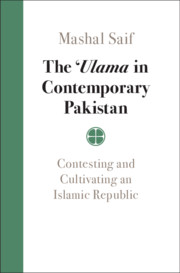Book contents
- The ‘Ulama in Contemporary Pakistan
- The ‘Ulama in Contemporary Pakistan
- Copyright page
- Dedication
- Contents
- Acknowledgments
- Note on Translation and Transliteration
- Introduction
- 1 The Clerics and the Council
- 2 Sovereignty between God and the State
- 3 Questioning State Identity and Legitimacy
- 4 Seeking Security
- 5 Minority Aspirations and the State
- Conclusion
- Bibliography
- Index
5 - Minority Aspirations and the State
Shi‘a Political Theology1
Published online by Cambridge University Press: 20 October 2020
- The ‘Ulama in Contemporary Pakistan
- The ‘Ulama in Contemporary Pakistan
- Copyright page
- Dedication
- Contents
- Acknowledgments
- Note on Translation and Transliteration
- Introduction
- 1 The Clerics and the Council
- 2 Sovereignty between God and the State
- 3 Questioning State Identity and Legitimacy
- 4 Seeking Security
- 5 Minority Aspirations and the State
- Conclusion
- Bibliography
- Index
Summary
Pakistani Shi‘as have often been painted as blind followers of the Iranian state’s political project. This fifth and final chapter challenges this dominant narrative. The author draws on her fieldwork among Shi‘a ‘ulama, showcasing the diversity and vibrancy of Shi‘a theo-political thought. Her ethnography highlights that three distinct theo-political projects characterize her interlocutors’ discourses. These are: (1) a secular state, (2) a sectarianly unaligned Islamic state, and (3) a state in which the governance of the jurist (wilayat-i faqih) – the political model of the current Iranian state – is implemented. Despite their differences, I contend that all these theo-political projects are propelled by the same force – the specter of violence. I assert that while the threat of violence drives these distinct political theologies, narrative historiography serves as an indispensable legitimizer. The ‘ulama articulate Pakistani history in a manner that justifies their specific theo-political projects. Significantly, Shi‘a ‘ulama’s political projects are often formulated and articulated in private realms for fear of state reprisal. Consequently, the ethnographic focus of this chapter is vital in highlighting the range of Shi‘a thought.
- Type
- Chapter
- Information
- The 'Ulama in Contemporary PakistanContesting and Cultivating an Islamic Republic, pp. 236 - 278Publisher: Cambridge University PressPrint publication year: 2020

